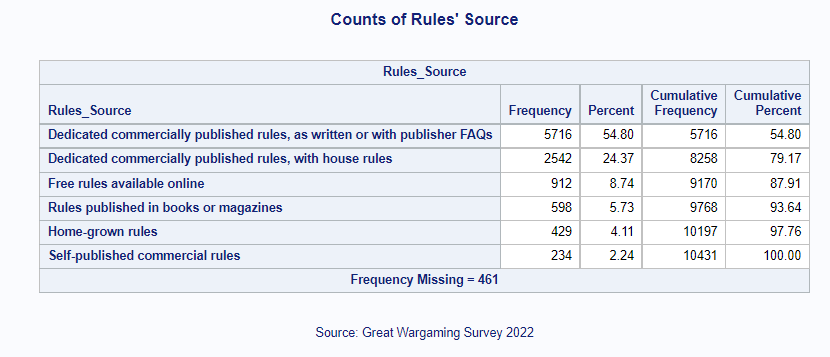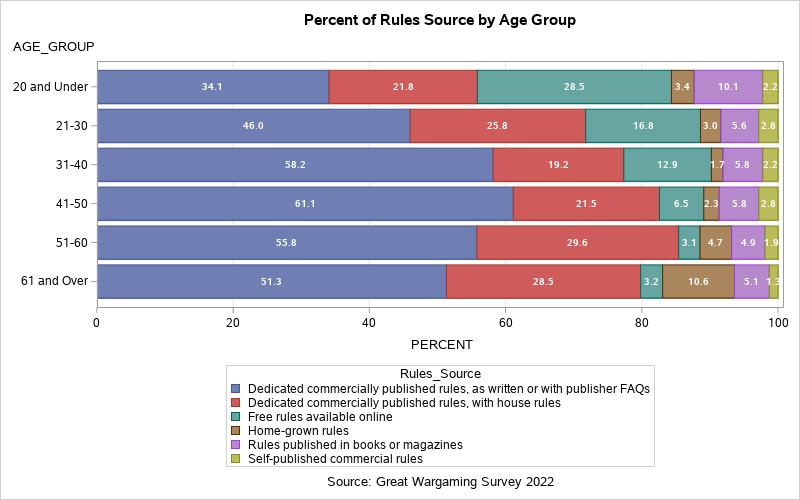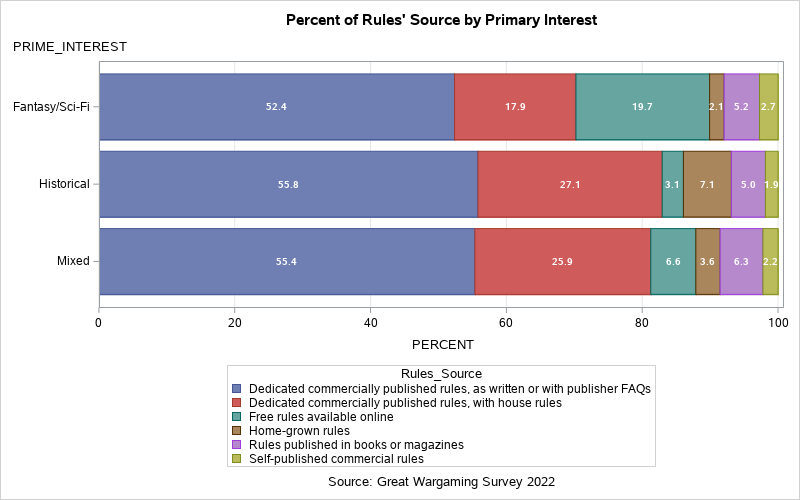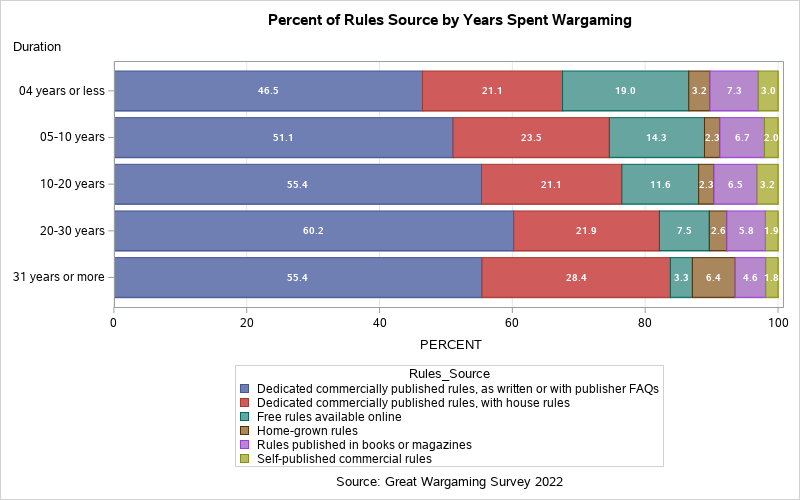GWS 2022: Where do you get your rules?
By Jonathan Freitag
With the 2022 Great Wargaming Survey wrapped up, it's time to begin digging into the survey responses.
While many of the questions remain the same from 2021, the 2022 survey saw a few new questions added into the mix. One of these new questions is the topic for today's installment.
The question of interest is: What is your primary source for rules.
The available choices were as follows:
- Dedicated commercially published rules, as written or with publisher FAQs
- Dedicated commercially published rules, with house rules
- Free rules available online
- Rules published in books or magazines
- Home-grown rules
- Self-published commercial rules
Having been in the wargaming hobby for a very long time, a quick glance over to my bookcase of rules shows rulebooks from a variety of sources. By raw numbers, commercial rulesets seem to dominate shelf space. However, there are many binders containing free and homegrown rules as well as rules clipped from magazines. A number of the classic rulesets are embedded within books on wargaming. A selection of self-published rules takes up shelf space as well.
What is my primary source for rules? Well, that is an answer that seems to never remain at rest. In the early days, rules in magazines and books offered inspiration when I had access to little else. With the arrival of the internet, I found much of value online. I am an avid commercial rules' collector too.
Inspiration comes from many sources. The period under study often drives primary rules source too. Some periods are only addressed by one source. For me, the answer seems to settle upon the notion that I find inspiration and value in all of the sources listed in the survey. By linear feet of shelf space, I suppose Dedicated, commercially published rules may take the First Place ribbon. Being a confirmed rules tinkerer, many of the commercial rules have a tendency to see a house rule or two to satisfy my tastes. Actually, I tend to tinker with house rules for all of the primary rules sources.
What does the survey have to say on such matters?
Counts by Source for Rules

Given the dominance of dedicated, commercially published rules, are there any tendencies that can be teased out of the data? I examined a few attributes.
Source for Rules by Age Group
When examined by Age Group, do any broad generalizations emerge? Yes. The younger cohorts tend to rely upon free or magazine/book rules more so than do the older cohorts. Older cohorts are more likely to explore home-grown rules. These older groups are also more likely to add house rules into a commercial ruleset.
Source for Rules by Primary Wargaming Interest
When survey results are stratified by Primary Interest (primary wargaming interest, that is, between historicals, fantasy/sci-fi, or a mix of the two), a big distinction between Fantasy/Sci-Fi and Historical gamers surfaces. Fantasy/Sci-Fi wargamers tend to stick to the rules as written (RAW). There seems little place for house rules, home-grown rules, or tinkering. Why is that? Perfect rules, focus on tournament play, or something else? The survey suggests that historical wargamers are more rules tinkerers than other groups. If you are an historical wargamer, is this your experience too? Are you a rules tinkerer?

Source for Rules by Years Spent Wargaming

As seen in tendencies from past survey analyses and the results for age and primary interest above, years spent in the wargaming hobby (Duration) offers no surprising results. In fact, duration confirms what has been presented. That is, newer wargamers tend toward free and magazine/book rules more so than do the old veterans of the hobby. These seasoned vets are more comfortable adopting house rules and home-grown rules than those with less 'time in grade'.
In whichever category you find yourself, whether by age group, primary interest, or years spent wargaming, I am always interested to read your thoughts on this topic.


2 comments
Certainly, as I have got older I have got more confident in adjusting commercial rulesets to fit my preferences. For example, I love Battlegroup rules for WW2, but don’t like fixed movement rates, so house rule movement to include a random element. I do think that some rules writers do encourage this through their attitude of ’it’s your game’ and this is where an active social media/online presence that publicises this attitude is really positive and helpful in encouraging ‘tinkering’!
Personally I find, as I get older learning new rules becomes harder/less appealing. If I want to try a new period/genre, I would rather tweak an existing set I already know